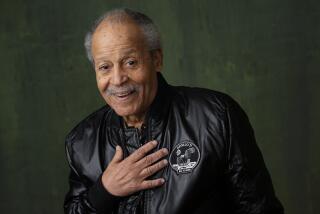A Hero Books a Final Fly-By
- Share via
After two years of tireless, ebullient lobbying, 76-year-old Sen. John Glenn, the first American to orbit the Earth, has persuaded NASA to reserve a seat for him on a space shuttle slated to rocket into space this October.
The Ohioan won his ticket to ride by arguing that science would benefit from observing how his aging body weathers the 10-day voyage, a pitch roundly dismissed by most scientists. But Glenn’s prospective voyage should not be diminished by its shaky rationale. The space program has always been as much about inspiration as exploration. Had science alone been the aim in the 1960s, NASA would never have spent $25 billion on manned missions to the moon; unmanned probes can do the job far more effectively. Just last week, NASA’s Lunar Prospector swooped into lunar orbit and scooped up more data with its spectrometers than all of the Apollo astronauts did in the 1960s and ‘70s.
Washington sent Glenn into Earth orbit in 1962 because it needed to restore national morale eroded by the Soviets’ superiority in early space flight. Then as now, skeptics dismissed Glenn’s mission as a government publicity ploy. But there was nothing manufactured about the enthusiastic throngs that greeted him on New York’s Broadway after his successful splashdown.
Glenn earned respect as a combat pilot in Korea and World War II, and for grimly humming the Battle Hymn of the Republic while plunging back into Earth’s atmosphere, uncertain whether his capsule would stand the heat. So when he returns to space (assuming he passes his physical), he’ll be taking far more than what cynics tab “a national joy ride.” He’ll be teaching us that adventure has no age limit, an American hero on a final fly-by.
More to Read
Sign up for Essential California
The most important California stories and recommendations in your inbox every morning.
You may occasionally receive promotional content from the Los Angeles Times.













